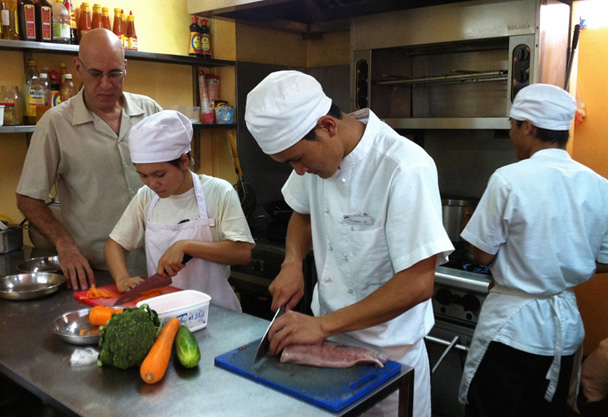With a Ph.D. in policy and management, experience working for the Walt Disney Company and Sheraton, and years of teaching restaurant and hospitality management courses at New York University and New York’s Institute of Culinary Education (ICE), Neal Bermas could have lived a very comfortable, even carefree, existence. Instead, he chose to help disadvantaged youths thousands of miles away attain their own dreams. Founded in 2007 with a focus on Vietnam, Bermas’ not-for-profit organization Streets International aims to help orphaned, poor, and other disadvantaged and at-risk young people prepare for careers in the hospitality industry. The group runs an 18-month training program— accredited by ICE—in Hoi An, as well as a café in that town and an outreach program in Hue.
Gourmet Live: What makes the hospitality industry a good choice for these young people’s careers?
Neal Bermas: It’s clear that in so-called developing countries, like Vietnam, the hospitality and tourism sector of the economy often takes off first. What we’ve learned is that this creates an incredible opportunity for trained people to work in international hotels and restaurants, especially if they also have some skills in the language of hospitality: English. This has been proven to us in Vietnam, the site of our first restaurant and training center, by the overwhelming demand for our trainees—young people formerly living in orphanages, on the streets, and in poor, subsistence-farming communities. When our first class graduated eight months ago, we had two or three job offers for every one of them, and mostly from the top five-star hotels. Within a month of graduation, we had achieved 100 percent employment!
GL: What in your own background drew you to this work?
NB: Of course, my professional background in hospitality consulting, experience as a restaurant owner and operator, and being an instructor at NYU and ICE helped. However, it was also the years of being a world traveler, perhaps a world citizen, that led me to think about my own contribution beyond the career accomplishments I had already achieved. I think it’s important that each of us find a time and place to use our talent to help others.
GL: What training does Streets International provide?
NB: The restaurant and training center provide a comprehensive culinary and hospitality program, credentialed by the award-winning Institute of Culinary Education in New York, as well as extensive English language instruction. Along with the 18-month program of classroom instruction and restaurant apprenticeship, each trainee is provided with housing, food, basic financial support, active community and social support, and medical care. It is very ambitious, but I have always had the philosophy that if you expect a lot, you get a lot!
GL: How do you choose the participants for the program? Is there a character trait or skill set you are looking for?
NB: Selecting the trainees is the one job I would like to give away. It is very difficult to choose the 15 to 20 trainees for each class. We are a relatively new organization, but we already get well over 100 applications for each class—all of the applicants deserving and from seriously disadvantaged backgrounds. If we don’t select them to come to Streets, they typically don’t have many other prospects for their future. We have a few basic criteria: 16 to 22 years old, no serious addictions or violent pasts, basic literacy in Vietnamese, able to do simple calculations, capable of learning English (which we test by repeating several times, “What is your name?”, and seeing if an applicant is able to mimic the words), and of course, very, very poor. Finally, I look for a twinkle in the eyes. Sadly, some of the kids we meet are already so beaten down by life that there’s not much energy left. But I feel if there’s still just a hint of life, we’ll be able to work with them.
GL: What are some of the typical backgrounds of your students?
NB: The most typical thing is just how poor they are. Most of the kids have never had three meals a day in their entire life; some have only had protein in their diet once every several weeks. We have kids who’ve grown up in orphanages because their families were too poor to feed them; we have kids off the streets, and a few kids who have been trafficked. We learn as much about them during the intake and interview process—and we’ve found that the tears we all experience in learning about these kids becomes a powerful motivator for us to do even more.
GL: Have any graduates gone on to open restaurants of their own or work in renowned hotels or restaurants in Vietnam or abroad?
NB: I am glad you asked this question. I just received a call yesterday from the Nam Hai resort just outside Hoi An. It is one of the top five-star resorts in the country—beautiful and elegant. When we first opened, the GM had visited our restaurant and training center; he knew the quality and type of training we are doing. They wanted to hire our entire first class. However, since it was best for our trainees to work at a number of resorts, just five were selected to start there a little over six months ago. The phone call was to let me know one of our cook trainees had had to cover for a sous-chef the other day, as they were shorthanded. He did such an amazing job, the executive chef was promoting him to that position. Less than two years ago, this same young man was living in an orphanage, and had a past that included several run-ins with the police. He’s now well on his way to a life no one—least of all him—could ever have envisioned. That’s the incredible story of Streets!



 Pinterest
Pinterest


